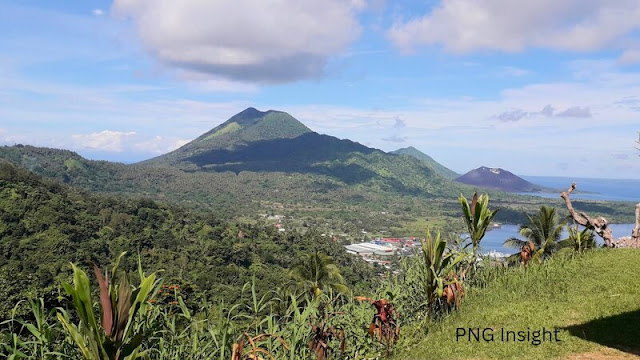The dawn of August 29, 2014, started like any other day in the town of Rabaul, nestled against the picturesque backdrop of Mount Tavurvur in Papua New Guinea. However, this tranquil morning was destined to be etched in history as one of the most significant events for the resilient people of this volcanic region.
 |
| IMAGE: Start of the Climb to the Top | Mt Tavurvur |
Papua New Guinea's Rabaul Volcano Eruption: Mt Tavurvur
Mount Tavurvur, a formidable stratovolcano, had been both a source of wonder and concern for the residents of Rabaul. Its majestic slopes and lush vegetation held secrets of its tumultuous past – a past punctuated by eruptions that had shaped the landscape and the community.
In 1994, its fiery fury had wreaked havoc upon Rabaul, leaving scars that the town had courageously borne. But little did anyone know that another eruption was lurking beneath its serene exterior, preparing to awaken.
As the morning sun painted the skies with shades of gold, the earth began to tremble, sending ripples of unease through the town. Locals who had witnessed the first devastating eruption of 1937, were on edge, wary of the signs nature was displaying.
"We've been through this before," Maria whispered to Samuel, clutching his arm as they watched the distant plume of ash rising from the heart of the mountain.
Local leaders in forefront at a time of need
News spread quickly through the town, and leaders like Mayor Simon and volcanologist Dr. Rodriguez swung into action. Roads leading to safer areas were marked, and evacuation plans were set in motion.
The memory of the 1937 eruption was fresh in their minds, a reminder of the importance of preparedness.
"We can't afford to wait. We need to act swiftly to ensure the safety of our people," Mayor Simon declared.
The rumbling of the earth escalated, and by 6:00 AM, the mountain roared to life. The sky turned dark as ash and smoke billowed into the atmosphere, blocking out the sun's rays. The ground shook violently, and the town was thrown into chaos. People scrambled to gather their belongings and make their way to the designated evacuation centers.
With remarkable unity, the residents of Rabaul, led by local leaders and officials, embarked on a journey of survival. The spirit of community shone brightly as families opened their homes to those who had lost everything.
The churches, particularly the Catholic Church under the guidance of Archbishop Carl Henn, became beacons of hope, providing shelter, food, and comfort to the displaced.
Rabaul Volcanological Observatory Volcanologist
Volcanologist Dr. Rodriguez, despite being hindered by the thick blanket of ash, managed to communicate vital information about the eruption's progression.
"This eruption is comparable in scale to the 1994 event," he explained. "We're closely monitoring lava flow and seismic activity to ensure the safety of everyone."
The eruption had caught even the national government off guard, prompting Prime Minister Rabbie Namaliu (who was also the member for Kokopo) to visit Rabaul, accompanied by other officials, to assess the situation firsthand. Upon returning to Port Moresby, Prime Minister Namaliu declared a state of emergency, ensuring that resources were swiftly directed towards relief efforts.
 |
| IMAGE: View from the Rabaul Volcanological Observatory |
Australia and the international community help
Australia and the international community, deeply moved by the catastrophe, extended their support. Aid and supplies arrived at Tokua Airport, a lifeline for the affected communities. The disaster, while testing the limits of preparation and response, showcased the resilience and unity of the Papua New Guinean people.
Days turned into weeks, and as the ash settled, the true extent of the damage became evident. Though the eruption had caused widespread destruction, the loss of life remained remarkably low, a testament to the swift action and preparedness of the people.
As the healing process began, the people of Rabaul looked to the future with determination. The lessons learned from this eruption would serve as a blueprint for facing the uncertain future that the volatile region held.
Mount Tavurvur, a mountain of both beauty and danger, had once again reminded its residents of their strength and resilience in the face of adversity.
Story of Rabaul's volcanic eruption
The story of Rabaul's volcanic eruption serves as a poignant reminder that nature's fury can strike at any moment.
Preparedness, unity, and a shared sense of responsibility can make all the difference in overcoming the challenges presented by such events.
As Papua New Guinea continues to forge its path forward, the courage and determination displayed by the people of Rabaul stand as a source of inspiration for generations to come.
PNG Insight compiles this story of Rabaul's volcanic eruptions from online sources to draw attention to the dangers of volcano eruptions in Papua New Guinea, especially in the New Guinea Island Region and Manam Island in the Momase Region.


No comments:
Post a Comment